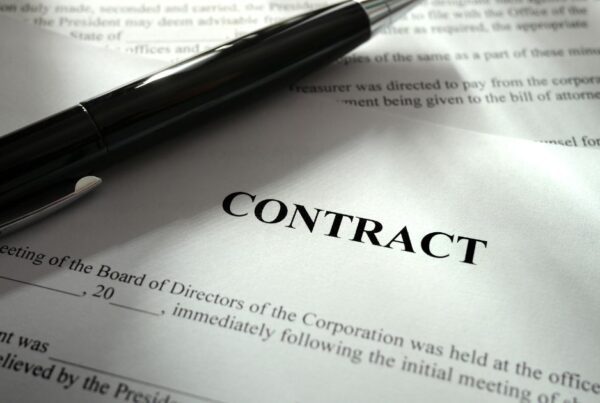 Disagreements between business partners are more common than most people realize. When those disagreements involve contracts, whether over profit-sharing, decision-making, or the direction of the company, they can quickly escalate and threaten the future of the business itself.
Disagreements between business partners are more common than most people realize. When those disagreements involve contracts, whether over profit-sharing, decision-making, or the direction of the company, they can quickly escalate and threaten the future of the business itself.
If you co-own a small business and are facing a dispute, understanding your legal options early on can help you protect your investment, relationships, and peace of mind.
What Causes Contract Disputes Between Business Co-Owners?
Partnerships and small businesses often begin with trust and shared goals. But as the company grows, so do differences in vision, management style, or financial priorities. Common causes of contract disputes between co-owners include:
- Unequal Contribution or Workload: One partner feels they’re doing more than the other.
- Profit Distribution Disagreements: Conflicts over how revenue should be divided.
- Breach of Fiduciary Duty: When one partner acts in their own interest instead of the company’s.
- Unauthorized Actions: A partner signing contracts or making financial decisions without the other’s consent.
- Exit or Buyout Terms: Unclear terms about what happens if one partner wants to leave.
Each of these issues ties back to the partnership or operating agreement, and how well it defines each owner’s rights and responsibilities.
Step 1: Review the Partnership or Operating Agreement
The first step in resolving a contract dispute is to look at the document that governs your business relationship. In Florida, most co-owned businesses operate under either a partnership agreement, operating agreement (for LLCs), or shareholders’ agreement (for corporations).
This document often outlines how disputes should be handled, including:
- Procedures for mediation or arbitration before going to court.
- Decision-making authority and voting rights.
- Buy-sell or dissolution provisions if the dispute can’t be resolved.
If no such agreement exists, Florida’s default business statutes will apply, which may not reflect your original intentions as co-owners. That’s why having a clear, lawyer-drafted agreement is critical even before disputes arise.
Step 2: Attempt Negotiation or Mediation
Many disputes can be resolved without litigation if both parties are willing to communicate. A business attorney can help facilitate negotiations or recommend mediation, a structured process led by a neutral third party.
Mediation is often faster and more cost-effective than going to court. It allows co-owners to preserve their working relationship while finding a fair, mutually beneficial resolution.
Even during mediation, having your own lawyer ensures that your rights and interests are protected, and that any agreement reached is enforceable.
Step 3: Consider Arbitration or Litigation
If negotiation or mediation fails, you may need to move to arbitration or litigation.
- Arbitration: A private process where a neutral arbitrator hears both sides and issues a binding decision. It’s usually faster and more confidential than court.
- Litigation: A lawsuit filed in court, often necessary when significant financial interests are at stake, or one party refuses to cooperate.
In Florida, contract disputes between business co-owners are typically heard in civil or commercial courts, depending on the size and structure of the business. Your attorney can advise whether you should pursue a breach of contract claim, a breach of fiduciary duty claim, or, in severe cases, a dissolution action to formally separate or dissolve the business.
Step 4: Protect the Business During the Dispute
A key concern in co-owner disputes is protecting the business’s operations while the disagreement is resolved. Your attorney can help you:
- Freeze disputed assets or accounts, if necessary.
- Prevent one partner from taking unilateral actions.
- Ensure payroll, contracts, and ongoing operations continue without disruption.
This step is especially critical in industries like real estate or construction, where contract deadlines and payments must continue even during internal conflict.
Step 5: Learn From the Dispute and Strengthen Future Agreements
Once the dispute is resolved, take time to evaluate what caused the problem and how to prevent it from happening again.
Consider working with your attorney to:
- Update or rewrite your operating or partnership agreement.
- Add clear dispute resolution procedures.
- Define authority levels and approval thresholds for key business decisions.
- Create buyout provisions for partners who want to exit.
Well-drafted contracts not only resolve disputes, but these contracts also prevent them from occurring in the first place.
When to Call a Business Litigation Attorney
At Ayala Law, we help business owners across Florida protect what they’ve built through skilled negotiation and, when necessary, strategic litigation. Whether your dispute involves breach of contract, mismanagement, or ownership rights, our team can help you take the right next step, one that protects both your interests and your business’s long-term future.
If discussions between co-owners have broken down or you believe your partner has violated your agreement, contact one of our experienced attorneys in Miami at 305-570-2208.
You can also contact our founding attorney Eduardo A. Maura at eduardo@ayalalawpa.com.
Schedule a case evaluation online here.
[The opinions in this blog are not intended to be legal advice. You should consult with an attorney about the particulars of your case].
Subscribe to Our Blog
Stay informed with our latest blog posts delivered directly to your inbox. Gain valuable legal insights, tips, and advice from our seasoned attorneys.







